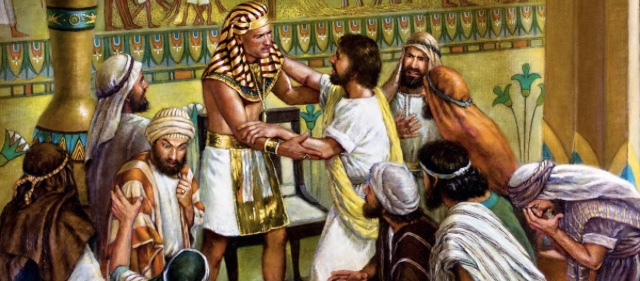“19 Joseph said to them, “Do not be afraid, for am I in the place of God? 20 But as for you, you meant evil against me; but God meant it for good, in order to bring it about as it is this day, to save many people alive. 21 Now therefore, do not be afraid; I will provide for you and your little ones.” And he comforted them and spoke kindly to them.” – GENESIS 50:19-21
“28 And we know that all things work together for good to those who love God, to those who are the called according to His purpose.” – ROMANS 8:28

The Story of Joseph
If you’ve never read the historical account of the sons of Jacob and their grave rivalry with their brother Joseph, then I suggest you read the Bible story (Genesis 37-50) and then read this article.
Of the many great real human stories of families with problems in the Bible, the story surrounding Jacob’s son, Joesph, is one of the greatest sagas ever.
When Joseph was still a youth, he and his brothers had a stormy relationship. Joseph was gifted with the power to interpret dreams and was the first son of Jacob’s beloved wife Rachel, who had only gave birth to a son after Jacob’s other wife, Leah, Rachel’s older sister, provided 10 sons to Jacob.
Long story short, Jacob’s brothers in lieu of murdering their brother or leaving him for dead, they chose to sell him to a passing merchant caravan heading to Egypt.
His brothers, figuring they’d never see their hated brother again, informed their father that Joseph had been eaten by wild animals and presented the now renown bloodied tunic of many colors as evidence.
After many years and several potentially life ending events later, Joseph, through God’s providence, rises to power in Egypt. Armed with God’s gifts of dream interpretation and a more mature character, Joseph finds himself in a unique circumstance to gain Pharaoh’s confidence. Consequently, such a trust was created, Joseph was awarded the position of Prime Minister of Egypt, second in power only to Pharaoh.
Bonus Reading: There is even more written about Joseph in uncanonized literature, particularly the beautiful story about Asenath, the daughter of Poti-Pherah priest of On. Her story surrounds a faithful spiritual conversion to become Joseph’s wife and therefore subjecting herself to his lordship and his worship of the God of Abraham, Isaac and Jacob. In Genesis is only a brief account of Asenath in the Biblical narrative (Genesis 41:45).
A brief Digression into the Darkness
I’ll leave you here with the story of Joseph, but you would probably find most people understanding that if they were in Joseph’s position, thrown naked into a pit and only in a last minute act of mercy by one brother, sold to slave traders. He was presumed gone forever never to see his father and home land again.
You just might be sympathetic if he felt a little bitter to the point of vengeance, harboring hate and revenge against his brothers. This is a common worldly theme we see repeated in society, reinforced by popular culture, media, TV and movies.
At every stage of Joseph’s new life as a slave in Egypt, when he experiences setbacks despite his best efforts to do good, we could imagine that lingering hatred might flash, with a desire to curse his cruel brothers (Genesis 37), or the sex-starved adulterous wife of Potiphar (Genesis 39), or the forgetful butler (Genesis 40), one could imagine quite a reinforced attitude of unforgiveness and hatred building in the soul of the young man who was mistreated and left to a life of slavery and possibly an early death.
Trusting in God’s Sovereign Will
In concert with God’s sovereign will, we can picture how over time Joseph matured beyond his youthful arrogance, transformed by suffering, remaining steadfast in his faithfulness to God.
In the process, Joseph developed and maintained one of the greatest attributes that can be possessed by a Christian: Forgiveness.
The greater one has received forgiveness, with a regenerate conscience, the more they feel compelled to forgive. For a born-again Christian, the sin debt that was paid for us by Christ on the Cross, to regain fellowship with a holy and righteous God, which results in an inheritance as a child of God in His kingdom, is root to a deep sense of gratitude. The gratitude of being reconciled for eternity to a just, merciful, and loving God is life changing and heart transforming.
We cannot know what brewed in the heart of Joseph as he rose to the rank of prime minister of Egypt, but his heart was truly one at peace with God and by extension, full of mercy and forgiveness to his brothers.
He did, however, test his brothers in regards to his younger brother Benjamin, and we do not know what judgment would have fallen upon the sons of Jacob had they harbored ill-will towards their youngest brother Benjamin (and the only other son by Rachel), but the spirit had long convicted the brothers of their abuse of Joseph and the story in Genesis explains their maturing in more detail.
Entering the kingdom of heaven, on God’s gracious terms through His Son who takes away the sin of the world (John 1:29), gives one a desire to honor God and God’s laws. Humility and forgiveness are at the core of a follower of Jesus. When you scale your humility and ability to forgive in relation to God’s amazing mercy and grace, you transform out of your old corruption and self-righteousness, they don’t fit anymore.
Those who recognizes that trials in life are part of God’s sovereign will, build a resilient faith in the following truths:
“You meant evil against me; but God meant it for good.” GENESIS 50:20
“And we know that all things work together for good to those who love God” ROMANS 8:28

CKY
***
Copyright © 2023 ChallenYee.com All Rights Reserved
